Unit 12 第5课时(Section A 2a-2c) (同步课件)-七年级英语下册同步精品课堂(人教版)
文档属性
| 名称 | Unit 12 第5课时(Section A 2a-2c) (同步课件)-七年级英语下册同步精品课堂(人教版) |
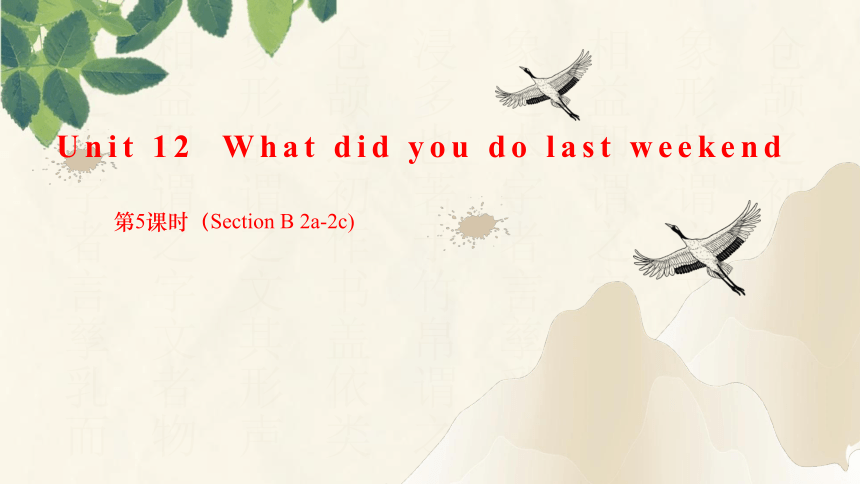
|
|
| 格式 | pptx | ||
| 文件大小 | 16.9MB | ||
| 资源类型 | 试卷 | ||
| 版本资源 | 人教新目标(Go for it)版 | ||
| 科目 | 英语 | ||
| 更新时间 | 2024-04-14 12:39:52 | ||
图片预览

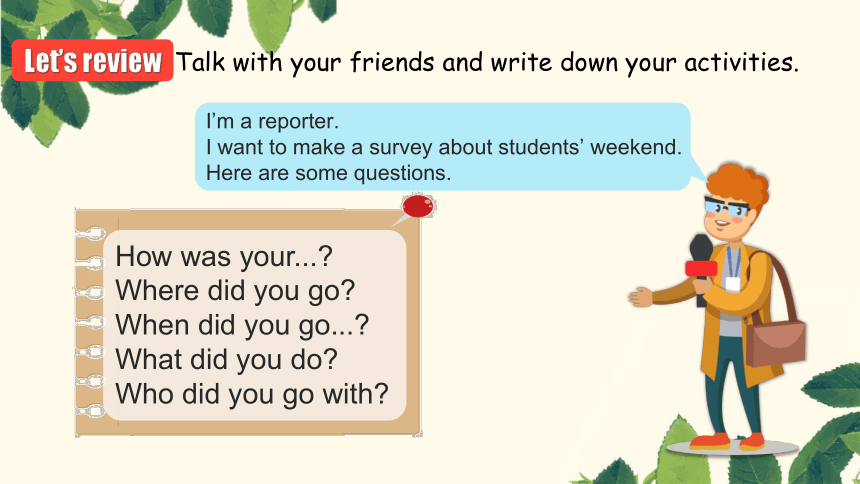

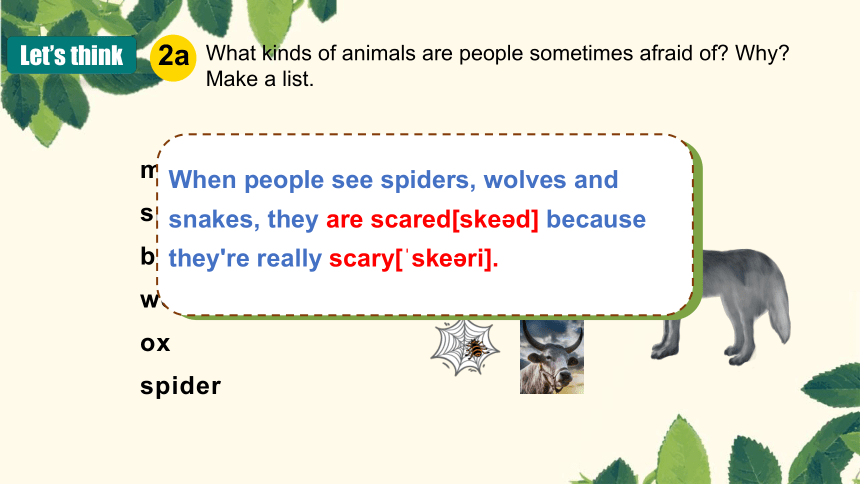
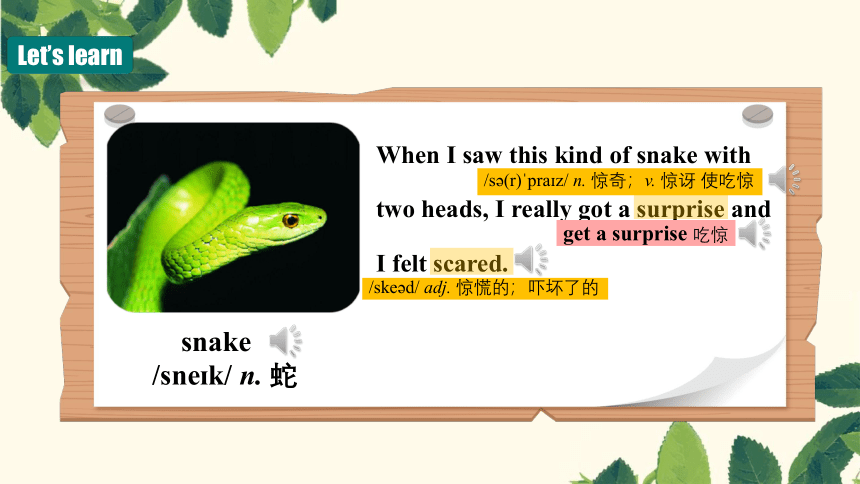
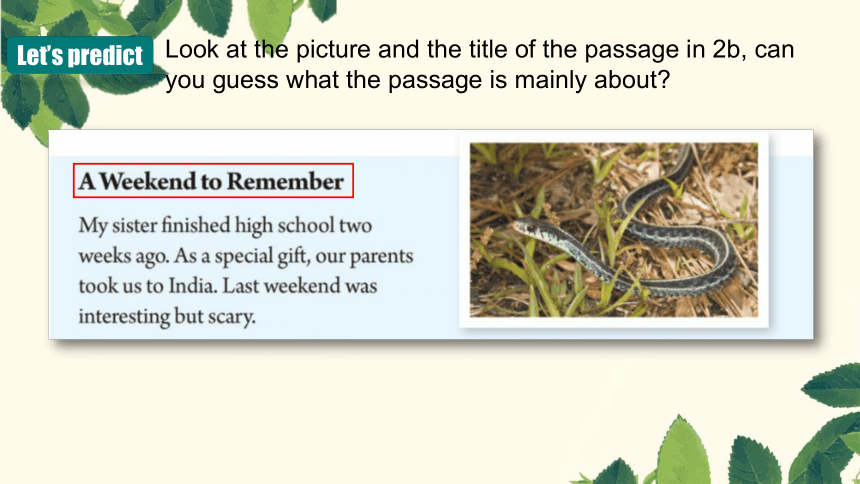

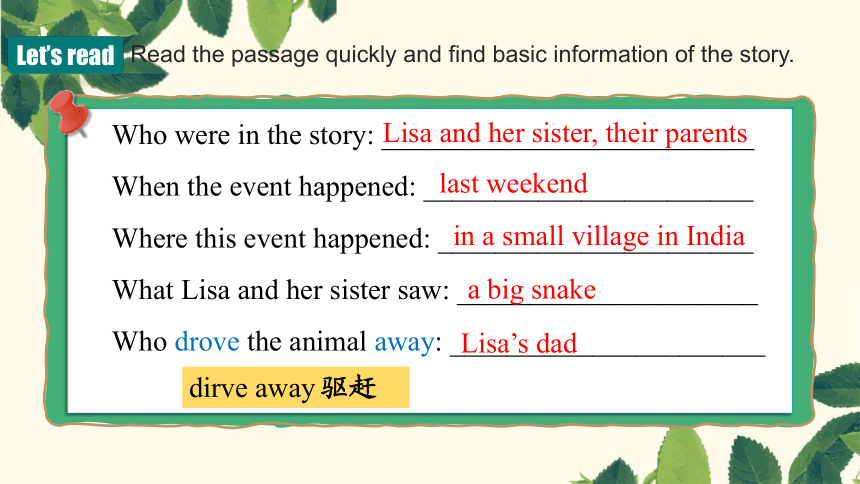
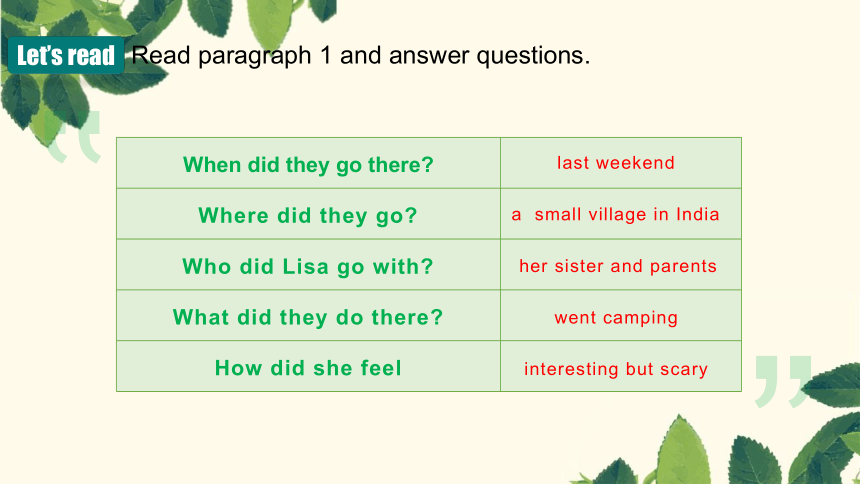
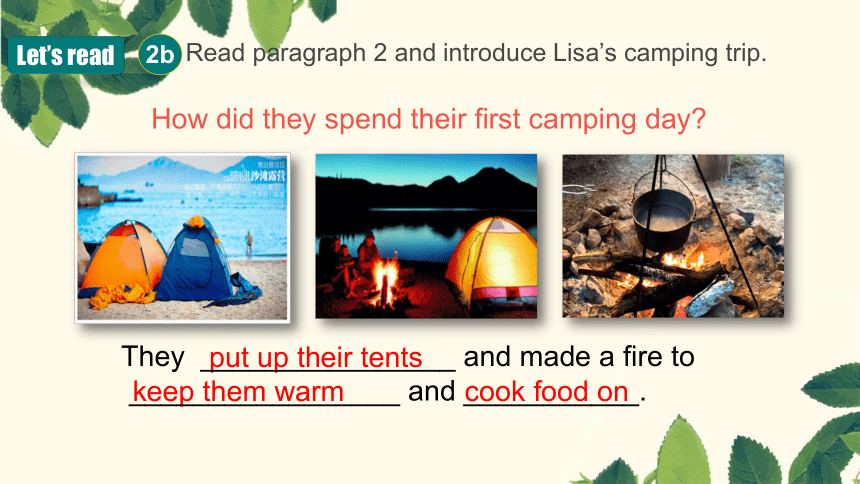
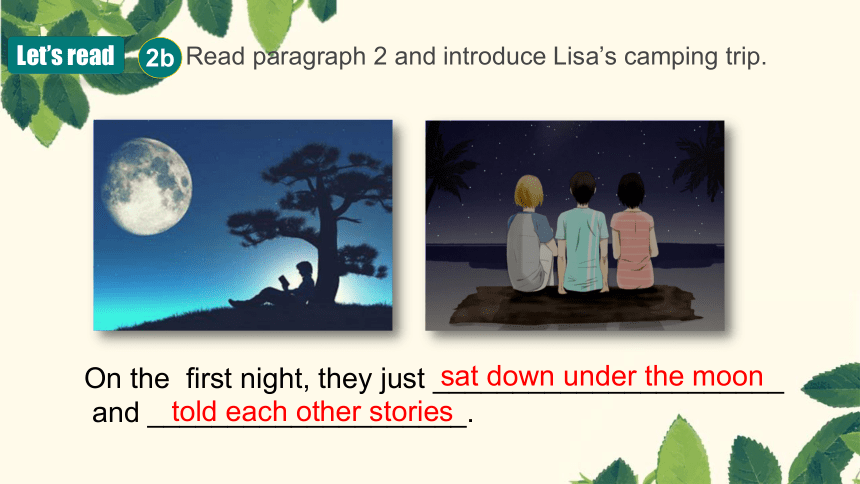
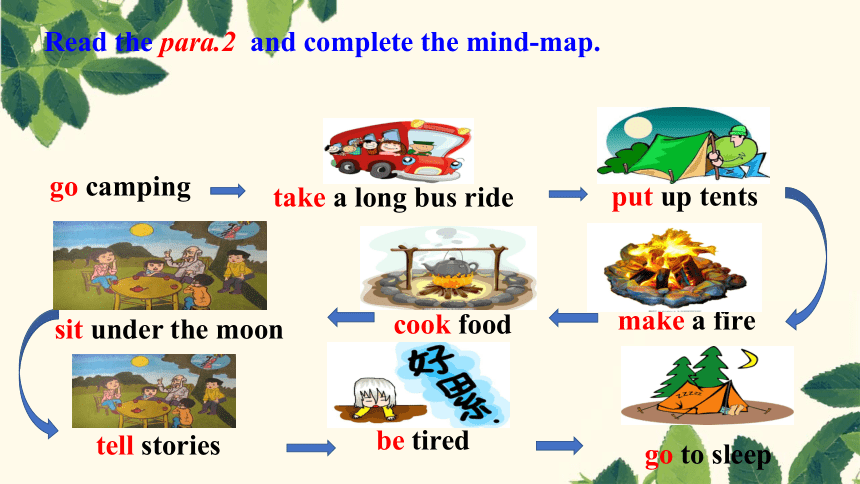
文档简介
(共31张PPT)
仓颉之初作书盖依类象形故谓之文其形声相益即谓之字文者物象之本字者言孳乳而浸多也著于竹帛谓之仓颉之初作书盖依类象形故谓之文其形声相益即谓之字文者物象之本字者言孳乳而
Unit 12 What did you do last weekend
第5课时(Section B 2a-2c)
Talk with your friends and write down your activities.
Let’s review
How was your...
Where did you go
When did you go...
What did you do
Who did you go with
I’m a reporter.
I want to make a survey about students’ weekend.
Here are some questions.
Let’s think.
spider
worm
lion
What animals are you afraid of Why
Do you like animals Why
Let’s think
What kinds of animals are people sometimes afraid of Why Make a list.
2a
mouse
snake
bear
wolf
ox
spider
When people see spiders, wolves and snakes, they are scared[ske d] because they're really scary[ ske ri].
Let’s learn
snake
/sne k/ n. 蛇
When I saw this kind of snake with two heads, I really got a surprise and I felt scared.
/s (r) pra z/ n. 惊奇;v. 惊讶 使吃惊
get a surprise 吃惊
/ske d/ adj. 惊慌的;吓坏了的
Let’s predict
Look at the picture and the title of the passage in 2b, can you guess what the passage is mainly about
Let’s read
Can you guess what type of writing (文体) the passage is according to the title and your prediction
expository writing(说明文)
narrative writing(记叙文)
argumentative writing(议论文)
practical writing(应用文)
A
B
C
D
Scan the passage and check if your prediction is correct.
Let’s read
Read the passage quickly and find basic information of the story.
Who were in the story: __________________________
When the event happened: _______________________
Where this event happened: ______________________
What Lisa and her sister saw: _____________________
Who drove the animal away: ______________________
Lisa and her sister, their parents
last weekend
in a small village in India
a big snake
Lisa’s dad
dirve away 驱赶
Let’s read
Read paragraph 1 and answer questions.
When did they go there
Where did they go
Who did Lisa go with
What did they do there
How did she feel
last weekend
a small village in India
her sister and parents
went camping
interesting but scary
Let’s read
2b
Read paragraph 2 and introduce Lisa’s camping trip.
How did they spend their first camping day
put up their tents
keep them warm
cook food on
They ________________ and made a fire to
_________________ and ___________.
Let’s read
2b
Read paragraph 2 and introduce Lisa’s camping trip.
On the first night, they just ______________________
and ____________________.
sat down under the moon
told each other stories
Read the para.2 and complete the mind-map.
go camping
take a long bus ride
put up tents
make a fire
cook food
sit under the moon
tell stories
be tired
go to sleep
Read the passage in 2b again and fill in the blanks.
Lisa’s family went to a small village in India to spend the weekend last week. There they _____ up tents and _____ a fire. On the first night, they _____ under the moon and _____ each other stories. The next morning, Lisa and her sister got a terrible _______. They saw a big snake. Lisa was so _____ that she couldn’t move. Then her father
______ up and down in the tents. This woke the snake up and it _____ into the forest near the lake.
put
made
sat
told
surprise
scared
jumped
moved
Let’s complete
2b
Read about Lisa’s weekend and answer the questions.
How was Lisa’s weekend
2. Where did Lisa and her family go last weekend
3. How did Lisa feel when she saw the snake
It was interesting but scary.
They went to a small village in India.
She was so scared that she couldn’t move.
4. What did Lisa and her sister do
5. What did their parents do Why did they do that
6. What lesson did Lisa learn from the weekend
They shouted to their parents.
Her father jumped up and down to scare the snake.
Don’t go near snakes./ Snakes can’t hear but they can feel movements.
Read the Para.3 and see what happened
Scary moment
Time
the next morning
Whatt
got a big _________→saw a big _______→ _______to their parents to let them know the _______→Dad started to ___________________ →______the snake up→moved ______ the forest→because…
A useful lessont
not to go near a snake
surprise
snake
shouted
danger
jump up and down
woke
into
6
2
8
4
7
5
3
snake went into the forest
put up our tents and cooked food
learned a useful lesson
saw a snake and shouted to parents for help
snakes can't hear but can feel things moving
my dad jumped up and down in his tent
took a bus to a small village in India
told stories under the moon, then went to sleep
Put the phrases in order according to the passage. Then use them to retell the story.
2c
1
Language points
1.My sister finished high school two weeks ago. 我姐姐两周前中学毕 业了。
high adj.& adv. 高的(地)
1) high作形容词,意为“高的” ,强调物体高出地面的空间高度。
The building is high. 这栋建筑很高。
high作副词,意为“高地”。既可表示物理上的高,也可表示价格、价值、评价等抽象意义上的高。
He can jump very high. 他能跳很高。
You should aim high. 你应该志向远大。
ago adv. 以前
2)ago作副词,不能单独使用,常用于“一段时间 + ago”结构,常与一般过去时连用。
He started to play the piano three years ago. 他三年前开始弹钢琴。
2.There we put up our tents and made a fire to keep us warm and cook food on.
在那里我们搭起帐篷,生火取暖并做饭。
put up 搭起;举起
put up在此意为“搭起”,是“动词 + 副词”型短语。其宾语为名词时,名词放在up之前或之后均可;宾语为代词时,代词要放在 put与up 之间。
It’s going to rain. Let’s put up the tent. 要下雨了。咱们把帐篷搭起来吧。
Here is the tent. Let’s put it up. 帐篷在这儿。咱们把它搭起来吧。
【拓展】put up的其他常见含义:
1)举起 He puts up his hand to ask a question. 他举起手来问问题。
2)张贴 They put up a notice on the wall. 他们在墙上贴了一张布告。
本句的主体部分是we put up tents and made a fire, 后续的 to keep us warm and cook food on (it) 表达的是made a fire 的目的。句尾介词“on” 后有所省略,以避免重复。
3.But I was so tired that I went to sleep early. 但是我太累了,所以早早就睡了。
so... that... 结构,意为“如此…… 以至于 ……”,是固定结构,so 后接形容词或副词,that 后接句子表示结果。
Jim is so busy that he has little time for his family.
吉姆太忙了,以至于他几乎没有时间陪他的家人。
【拓展】so... that ... 后的从句为肯定句时,该结构可与 ... enough to ... 互相转化;其后的从句为否定句时,它可以与 too ... to ... 互相转化。
The boy got up so early that he caught the early bus.
= The boy got up early enough to catch the early bus.
这个男孩起得很早,以至于他赶上了早班车。
He is so young that he can’t go to school. =He is too young to go to school.
他那么小,以至于不能去上学。
4.The next morning, my sister and I got a terrible surprise. 第二天早上,我和姐姐大吃一惊。
surprise n. 惊奇;惊讶 v. 使吃惊
1) surprise 在此处作名词,意为“惊奇,惊讶”。表示抽象事物时,用作不可数名词;表示具体事物时,用作可数名词。常用短语:
get a surprise 吃惊
I got a surprise when I saw the bill. 一看账单我吃了一惊。
give sb. a surprise 给某人一个惊喜
They give me a sueprise. 他们给我一个惊喜。
in surprise 惊奇地,惊讶地
They looked at each other in surprise.他们惊讶地看着对方。
to one’s surprise 让某人惊讶的是
To my surprise, he didn’t pass the exam. 让我惊讶的是,他没有通过考试。
2) surprise也可作及物动词,意为“使吃惊”。
The news surprised me a lot. 这消息使我非常惊讶。
3) the next morning 第二天早上(过去时) next morning明天早上(将来时)
5.When we looked out of our tent, we saw a big snake sleeping near the fire.
我们向帐篷外看时,看到了一条大蛇正在篝火旁睡觉。
1)look out of 向 ……外看
look out of后接名词或代词,其反义短语为 look into。
The boy is looking out of the window. 这个男孩正在向窗外看。
【拓展】look out意为“当心”,相当于 be careful。
Look out! Here comes a car. 当心!过来一辆小汽车。
2)see sb./sth. doing sth. 看见某人/某物正在做某事
see sb./sth. doing sth. 意为“看见某人/某物正在做某事”,强调看到动作正在发生;
see sb./sth. do sth. 意为“看到某人/某物做了某事”,强调看见动作发生的全过程,或者看到动作经常发生。
I saw him playing basketball at nine o’clock in the morning. 上午9点钟,我看到他正在打篮球。
I often see her read in the library. 我经常看到她在图书馆看书。
6.I was so scared that I couldn’t move.
我是那么害怕,一动都不敢动。
scared adj. 惊慌的;吓坏了的
scared作形容词,通常用来修饰人,常用结构有:
1)be scared of sth. /doing sth.害怕某物/做某事
My cousin isn’t scared of snakes. 我堂姐不害怕蛇。
2)be scared to do sth.害怕做某事
She is scared to climb the tree. 她害怕爬树。
【拓展】scary作形容词,意为“吓人的;恐怖的“,常用来修饰物。
The movie is scary. Can you watch it with me
这部电影很恐怖。你能和我一起看吗?
7.This woke the snake up and it moved into the forest near the lake.
这一举动惊醒了蛇,它爬进了湖边的树林里。
wake... up 把…… 弄醒
wake ... up 中的 wake作动词,意为“弄醒,醒”;up为副词。该短语为“动词 + 副词”型短语,当宾语是名词时,名词可以放在wake和up之间,也可以放在up的后面;当宾语是代词时,代词必须放在wake和up之间。
Wake up your brother. It’s time for breakfast. 把你弟弟叫醒。该吃早饭了。
I’ll wake you up for the medicine. 我会叫醒你吃药的。
【拓展】wake up 还可作不及物动词短语,意为“醒,醒来”。
My grandma usually wakes up early.
我奶奶通常醒得早。
8. As a special gift, our parents took us to India.
作为一份特殊的礼物, 我爸妈带着我们去了印度。
1) 此处介词as 表示“作为……; 当作……”,其后可以接职业,用途,特点等。用在句首时,这种短语的后面往往有逗号与句子的主体隔开。
As a student, I must work hard.
作为一名学生,我必须努力学习。
2) 本句中动词take 表示“带领”, take … to …则表示“带领某人去某处”。
On Sundays, the father would take his son to the park.
一到星期天,爸爸便会带他的儿子去公园。
【辨析】 bring, take, carry, fetch
bring 意为“拿来,带来”,表示“拿到靠说话人近的地方”。
take 意为“拿走,带走”,表示“拿到远离说话人远的地方”。
carry 意为“扛,搬”,用力移动,没有方向性。
fetch 意为“去取,去拿”表示往返拿物。
9. My dad told me later that snakes don’t have ears but he can feel things moving.
我的爸爸后来告诉我蛇没有耳朵,但是他能感觉到东西在移动。
表示感官的动词,例如see, hear, feel 等动词后可以接动词-ing 短语,表示“看见、听到、觉得某人或物在做……(某事)”。
see/watch/feel/hear sb. doing sth. 看到/观察到/觉得/听到某人在做某事
We can hear water running from the mountain. 我们能听到水从山上流下来的声音。
10.On the first night, … 在头一天夜里,……
表示一天中的时间分别采用at night (在夜里)、in the morning (在上午)、in the evening (在下午)等,但表示“在某一天上午、下午或晚上等”的特定时间,往往使用介词on。
On the early morning of November 20th, we got a special postcard.
在11月20号一大清早,我们收到了一张特殊的明信片。
ago tent surprise moon scared move start into
一、选词填空。
1. She went ____ the kitchen to cook some food.
2. The ______ circles (围绕) the earth every 28 days.
3. They came to visit China two days ____.
4. Do you know how to put up a ____
5. She got a great _______ when she got a new bike.
6. My grandparents _______ to the countryside last year.
7. She _______ to learn English when she was ten.
8. She was really ______ to cross the rope way (索道).
tent
into
ago
moon
surprise
moved
started
scared
1. Laura __________ (放风筝) in the park last Friday.
2. My sister is _______________(备考) these days.
3. I ________________________ (和我的朋友们吃晚餐) every weekend.
4. Lisa _______________(去图书馆) with her brother two days ago.
5. Did they __________________________ (在游泳池游泳)yesterday
flew a kite
studying for a test
二、根据句意及所给汉语提示,完成句子。
have dinner with my friends
went to the library
swim in the (swimming) pool
仓颉之初作书盖依类象形故谓之文其形声相益即谓之字文者物象之本字者言孳乳而浸多也著于竹帛谓之仓颉之初作书盖依类象形故谓之文其形声相益即谓之字文者物象之本字者言孳乳而
谢君一赏
仓颉之初作书盖依类象形故谓之文其形声相益即谓之字文者物象之本字者言孳乳而浸多也著于竹帛谓之仓颉之初作书盖依类象形故谓之文其形声相益即谓之字文者物象之本字者言孳乳而
Unit 12 What did you do last weekend
第5课时(Section B 2a-2c)
Talk with your friends and write down your activities.
Let’s review
How was your...
Where did you go
When did you go...
What did you do
Who did you go with
I’m a reporter.
I want to make a survey about students’ weekend.
Here are some questions.
Let’s think.
spider
worm
lion
What animals are you afraid of Why
Do you like animals Why
Let’s think
What kinds of animals are people sometimes afraid of Why Make a list.
2a
mouse
snake
bear
wolf
ox
spider
When people see spiders, wolves and snakes, they are scared[ske d] because they're really scary[ ske ri].
Let’s learn
snake
/sne k/ n. 蛇
When I saw this kind of snake with two heads, I really got a surprise and I felt scared.
/s (r) pra z/ n. 惊奇;v. 惊讶 使吃惊
get a surprise 吃惊
/ske d/ adj. 惊慌的;吓坏了的
Let’s predict
Look at the picture and the title of the passage in 2b, can you guess what the passage is mainly about
Let’s read
Can you guess what type of writing (文体) the passage is according to the title and your prediction
expository writing(说明文)
narrative writing(记叙文)
argumentative writing(议论文)
practical writing(应用文)
A
B
C
D
Scan the passage and check if your prediction is correct.
Let’s read
Read the passage quickly and find basic information of the story.
Who were in the story: __________________________
When the event happened: _______________________
Where this event happened: ______________________
What Lisa and her sister saw: _____________________
Who drove the animal away: ______________________
Lisa and her sister, their parents
last weekend
in a small village in India
a big snake
Lisa’s dad
dirve away 驱赶
Let’s read
Read paragraph 1 and answer questions.
When did they go there
Where did they go
Who did Lisa go with
What did they do there
How did she feel
last weekend
a small village in India
her sister and parents
went camping
interesting but scary
Let’s read
2b
Read paragraph 2 and introduce Lisa’s camping trip.
How did they spend their first camping day
put up their tents
keep them warm
cook food on
They ________________ and made a fire to
_________________ and ___________.
Let’s read
2b
Read paragraph 2 and introduce Lisa’s camping trip.
On the first night, they just ______________________
and ____________________.
sat down under the moon
told each other stories
Read the para.2 and complete the mind-map.
go camping
take a long bus ride
put up tents
make a fire
cook food
sit under the moon
tell stories
be tired
go to sleep
Read the passage in 2b again and fill in the blanks.
Lisa’s family went to a small village in India to spend the weekend last week. There they _____ up tents and _____ a fire. On the first night, they _____ under the moon and _____ each other stories. The next morning, Lisa and her sister got a terrible _______. They saw a big snake. Lisa was so _____ that she couldn’t move. Then her father
______ up and down in the tents. This woke the snake up and it _____ into the forest near the lake.
put
made
sat
told
surprise
scared
jumped
moved
Let’s complete
2b
Read about Lisa’s weekend and answer the questions.
How was Lisa’s weekend
2. Where did Lisa and her family go last weekend
3. How did Lisa feel when she saw the snake
It was interesting but scary.
They went to a small village in India.
She was so scared that she couldn’t move.
4. What did Lisa and her sister do
5. What did their parents do Why did they do that
6. What lesson did Lisa learn from the weekend
They shouted to their parents.
Her father jumped up and down to scare the snake.
Don’t go near snakes./ Snakes can’t hear but they can feel movements.
Read the Para.3 and see what happened
Scary moment
Time
the next morning
Whatt
got a big _________→saw a big _______→ _______to their parents to let them know the _______→Dad started to ___________________ →______the snake up→moved ______ the forest→because…
A useful lessont
not to go near a snake
surprise
snake
shouted
danger
jump up and down
woke
into
6
2
8
4
7
5
3
snake went into the forest
put up our tents and cooked food
learned a useful lesson
saw a snake and shouted to parents for help
snakes can't hear but can feel things moving
my dad jumped up and down in his tent
took a bus to a small village in India
told stories under the moon, then went to sleep
Put the phrases in order according to the passage. Then use them to retell the story.
2c
1
Language points
1.My sister finished high school two weeks ago. 我姐姐两周前中学毕 业了。
high adj.& adv. 高的(地)
1) high作形容词,意为“高的” ,强调物体高出地面的空间高度。
The building is high. 这栋建筑很高。
high作副词,意为“高地”。既可表示物理上的高,也可表示价格、价值、评价等抽象意义上的高。
He can jump very high. 他能跳很高。
You should aim high. 你应该志向远大。
ago adv. 以前
2)ago作副词,不能单独使用,常用于“一段时间 + ago”结构,常与一般过去时连用。
He started to play the piano three years ago. 他三年前开始弹钢琴。
2.There we put up our tents and made a fire to keep us warm and cook food on.
在那里我们搭起帐篷,生火取暖并做饭。
put up 搭起;举起
put up在此意为“搭起”,是“动词 + 副词”型短语。其宾语为名词时,名词放在up之前或之后均可;宾语为代词时,代词要放在 put与up 之间。
It’s going to rain. Let’s put up the tent. 要下雨了。咱们把帐篷搭起来吧。
Here is the tent. Let’s put it up. 帐篷在这儿。咱们把它搭起来吧。
【拓展】put up的其他常见含义:
1)举起 He puts up his hand to ask a question. 他举起手来问问题。
2)张贴 They put up a notice on the wall. 他们在墙上贴了一张布告。
本句的主体部分是we put up tents and made a fire, 后续的 to keep us warm and cook food on (it) 表达的是made a fire 的目的。句尾介词“on” 后有所省略,以避免重复。
3.But I was so tired that I went to sleep early. 但是我太累了,所以早早就睡了。
so... that... 结构,意为“如此…… 以至于 ……”,是固定结构,so 后接形容词或副词,that 后接句子表示结果。
Jim is so busy that he has little time for his family.
吉姆太忙了,以至于他几乎没有时间陪他的家人。
【拓展】so... that ... 后的从句为肯定句时,该结构可与 ... enough to ... 互相转化;其后的从句为否定句时,它可以与 too ... to ... 互相转化。
The boy got up so early that he caught the early bus.
= The boy got up early enough to catch the early bus.
这个男孩起得很早,以至于他赶上了早班车。
He is so young that he can’t go to school. =He is too young to go to school.
他那么小,以至于不能去上学。
4.The next morning, my sister and I got a terrible surprise. 第二天早上,我和姐姐大吃一惊。
surprise n. 惊奇;惊讶 v. 使吃惊
1) surprise 在此处作名词,意为“惊奇,惊讶”。表示抽象事物时,用作不可数名词;表示具体事物时,用作可数名词。常用短语:
get a surprise 吃惊
I got a surprise when I saw the bill. 一看账单我吃了一惊。
give sb. a surprise 给某人一个惊喜
They give me a sueprise. 他们给我一个惊喜。
in surprise 惊奇地,惊讶地
They looked at each other in surprise.他们惊讶地看着对方。
to one’s surprise 让某人惊讶的是
To my surprise, he didn’t pass the exam. 让我惊讶的是,他没有通过考试。
2) surprise也可作及物动词,意为“使吃惊”。
The news surprised me a lot. 这消息使我非常惊讶。
3) the next morning 第二天早上(过去时) next morning明天早上(将来时)
5.When we looked out of our tent, we saw a big snake sleeping near the fire.
我们向帐篷外看时,看到了一条大蛇正在篝火旁睡觉。
1)look out of 向 ……外看
look out of后接名词或代词,其反义短语为 look into。
The boy is looking out of the window. 这个男孩正在向窗外看。
【拓展】look out意为“当心”,相当于 be careful。
Look out! Here comes a car. 当心!过来一辆小汽车。
2)see sb./sth. doing sth. 看见某人/某物正在做某事
see sb./sth. doing sth. 意为“看见某人/某物正在做某事”,强调看到动作正在发生;
see sb./sth. do sth. 意为“看到某人/某物做了某事”,强调看见动作发生的全过程,或者看到动作经常发生。
I saw him playing basketball at nine o’clock in the morning. 上午9点钟,我看到他正在打篮球。
I often see her read in the library. 我经常看到她在图书馆看书。
6.I was so scared that I couldn’t move.
我是那么害怕,一动都不敢动。
scared adj. 惊慌的;吓坏了的
scared作形容词,通常用来修饰人,常用结构有:
1)be scared of sth. /doing sth.害怕某物/做某事
My cousin isn’t scared of snakes. 我堂姐不害怕蛇。
2)be scared to do sth.害怕做某事
She is scared to climb the tree. 她害怕爬树。
【拓展】scary作形容词,意为“吓人的;恐怖的“,常用来修饰物。
The movie is scary. Can you watch it with me
这部电影很恐怖。你能和我一起看吗?
7.This woke the snake up and it moved into the forest near the lake.
这一举动惊醒了蛇,它爬进了湖边的树林里。
wake... up 把…… 弄醒
wake ... up 中的 wake作动词,意为“弄醒,醒”;up为副词。该短语为“动词 + 副词”型短语,当宾语是名词时,名词可以放在wake和up之间,也可以放在up的后面;当宾语是代词时,代词必须放在wake和up之间。
Wake up your brother. It’s time for breakfast. 把你弟弟叫醒。该吃早饭了。
I’ll wake you up for the medicine. 我会叫醒你吃药的。
【拓展】wake up 还可作不及物动词短语,意为“醒,醒来”。
My grandma usually wakes up early.
我奶奶通常醒得早。
8. As a special gift, our parents took us to India.
作为一份特殊的礼物, 我爸妈带着我们去了印度。
1) 此处介词as 表示“作为……; 当作……”,其后可以接职业,用途,特点等。用在句首时,这种短语的后面往往有逗号与句子的主体隔开。
As a student, I must work hard.
作为一名学生,我必须努力学习。
2) 本句中动词take 表示“带领”, take … to …则表示“带领某人去某处”。
On Sundays, the father would take his son to the park.
一到星期天,爸爸便会带他的儿子去公园。
【辨析】 bring, take, carry, fetch
bring 意为“拿来,带来”,表示“拿到靠说话人近的地方”。
take 意为“拿走,带走”,表示“拿到远离说话人远的地方”。
carry 意为“扛,搬”,用力移动,没有方向性。
fetch 意为“去取,去拿”表示往返拿物。
9. My dad told me later that snakes don’t have ears but he can feel things moving.
我的爸爸后来告诉我蛇没有耳朵,但是他能感觉到东西在移动。
表示感官的动词,例如see, hear, feel 等动词后可以接动词-ing 短语,表示“看见、听到、觉得某人或物在做……(某事)”。
see/watch/feel/hear sb. doing sth. 看到/观察到/觉得/听到某人在做某事
We can hear water running from the mountain. 我们能听到水从山上流下来的声音。
10.On the first night, … 在头一天夜里,……
表示一天中的时间分别采用at night (在夜里)、in the morning (在上午)、in the evening (在下午)等,但表示“在某一天上午、下午或晚上等”的特定时间,往往使用介词on。
On the early morning of November 20th, we got a special postcard.
在11月20号一大清早,我们收到了一张特殊的明信片。
ago tent surprise moon scared move start into
一、选词填空。
1. She went ____ the kitchen to cook some food.
2. The ______ circles (围绕) the earth every 28 days.
3. They came to visit China two days ____.
4. Do you know how to put up a ____
5. She got a great _______ when she got a new bike.
6. My grandparents _______ to the countryside last year.
7. She _______ to learn English when she was ten.
8. She was really ______ to cross the rope way (索道).
tent
into
ago
moon
surprise
moved
started
scared
1. Laura __________ (放风筝) in the park last Friday.
2. My sister is _______________(备考) these days.
3. I ________________________ (和我的朋友们吃晚餐) every weekend.
4. Lisa _______________(去图书馆) with her brother two days ago.
5. Did they __________________________ (在游泳池游泳)yesterday
flew a kite
studying for a test
二、根据句意及所给汉语提示,完成句子。
have dinner with my friends
went to the library
swim in the (swimming) pool
仓颉之初作书盖依类象形故谓之文其形声相益即谓之字文者物象之本字者言孳乳而浸多也著于竹帛谓之仓颉之初作书盖依类象形故谓之文其形声相益即谓之字文者物象之本字者言孳乳而
谢君一赏
同课章节目录
- Unit 1 Can you play the guitar?
- Section A
- Section B
- Unit 2 What time do you go to school?
- Section A
- Section B
- Unit 3 How do you get to school?
- Section A
- Section B
- Unit 4 Don't eat in class.
- Section A
- Section B
- Unit 5 Why do you like pandas?
- Section A
- Section B
- Unit 6 I'm watching TV.
- Section A
- Section B
- Review of Units 1-6
- Unit 7 It's raining!
- Section A
- Section B
- Unit 8 Is there a post office near here?
- Section A
- Section B
- Unit 9 What does he look like?
- Section A
- Section B
- Unit 10 I'd like some noodles.
- Section A
- Section B
- Unit 11 How was your school trip?
- Section A
- Section B
- Unit 12 What did you do last weekend?
- Section A
- Section B
